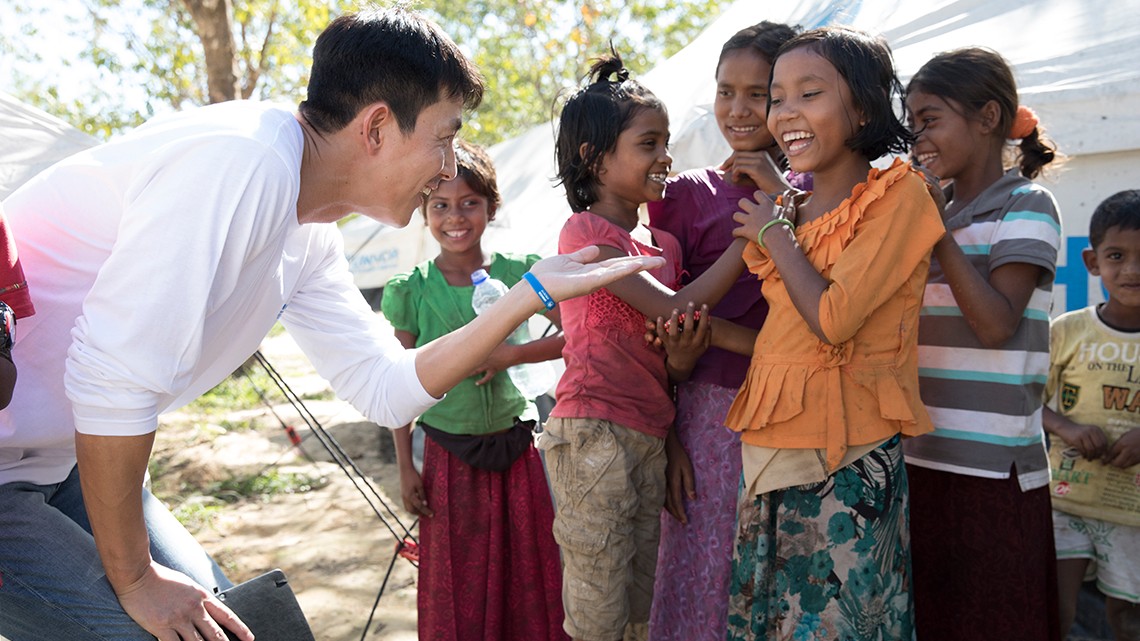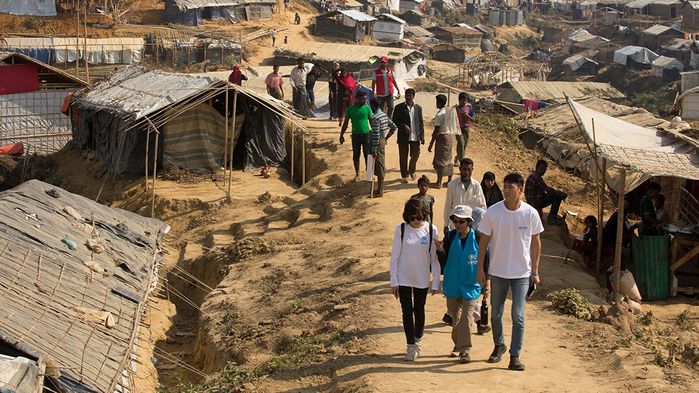


Hundreds of thousands of Maungdaws were forced to leave Myanmar in the massive massacre that occurred in the summer of 2017. More than 600,000 people headed to Kutupalong near Cox Bazar in Bangladesh, when more than 300,000 Maungdaw were already living in refugee Camps. In an instant, a city of 1 million people, consisting of constantly continuing shacks, was born.
In December 2017, I went to the Kutupalong Refugee Camp; since I had already visited Iraq's refugee Camp once that summer, there were no plans to visit overseas refugee Camps in addition. However, I could not stay still after hearing the story of Rohingya refugees in a meeting with the top representative of the United Nations Refugee Organization in Filippo Grandi who visited Korea in October.
Grandi said most of the Rohingya refugee women she met were raped, most of the children witnessed the death of their parents, and the majority of their parents witnessed the death of their children. As soon as a few schedulings were made, I got on a flight to Bangladesh.
Kotisha, seven months pregnant, who met at the Coutupalong Camp, had to witness with her eyes as Myanmar soldiers dragged her husband out of the house and shot him. She didn’t know why her husband had to die, and it made her feel even more heartbreaking to talk about it, as if she had dried up tears.
She was a mid-fifties woman, and she had to suffer her husband’s death, as was the case with other Rohingya refugees, and yet she tried to stay in her hometown. But when his son-in-law was killed, he could not hold on anymore. Eventually, he took his daughters across the border.
In the Kutupalong Camp, where the sad story of losing my family was built up, I came to think about the meaning of Cho Kuk once again. The refugees I had previously met in Nepal, South Sudan, Lebanon and Iraq all wanted to eventually return home, home and Cho Kuk, but Rohingya refugees were different.
They saw the family being shot in front of them, the newborn baby being thrown into a burning bush. As they saw the entire village being exterminated or scattered in the land they had considered home, they seemed to have forgotten what to call their Cho Kuk. If they didn’t want to die, they would have to go away, and those who walked hundreds of miles barefoot had no home to go back to.
There were historical and political reasons for the Religion reasons behind these ruthless oppressions. Experts disagree that Maungdaw, an Islamic minority, was subject to discrimination and oppression in the mainstream Myanmar.
It is often difficult to understand why Religion, which is created to appease the suffering of human beings in life, is so painful that Religion, who loves each other and calls for not to kill life, is causing human suffering. When we stay in a refugee Camp, we sometimes suspect that the Religion we pursue is a Religion that meets the needs of God.
The Kutupalong refugee Camp was created by pushing a whole mountain: a solution put forward by the Bangladesh government for Rohingya refugees who cross the border endlessly. In fact, Bangladesh has not actively expelled Rohingya refugees. It was difficult to physically prevent hundreds of thousands of people pouring across the border, and the Rohingya were similar in terms of ethnicity, Religion, and language to the Bangladesh people.
But it is hard to expect this generosity to continue, as Bangladesh is also a densely populated and poor country. Moreover, one million people are a very large number of people. If resources should be shared, concerns about environmental pollution will arise, and various conflicts of interest that may cause socioeconomically will be prolonged, there will be limitations in receiving continued hospitality from local residents. The troubles and concerns of the Bangladesh government are also at this point.
The Rohingya refugee Camp, which had made many thinkers, was re-visited in May 2019, a year and a half after the infamous mass massacre of civilians.
Time passed, but their suffering was still continuing, only that the difference was that their stories were gradually moving away from the world. But someone has to keep telling their stories to the world: they are still there, losing loved ones and being abandoned by Cho Kuk.
# In - It # Init # Jung Woo-sung # In the border, people
Jung Woo-sung actor. United Nations Refugee Agency Goodwill Ambassador. If you can see what I saw.